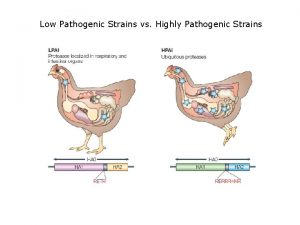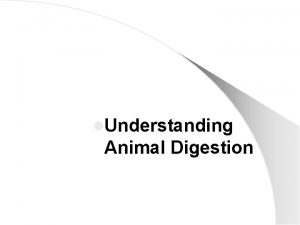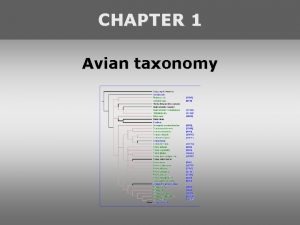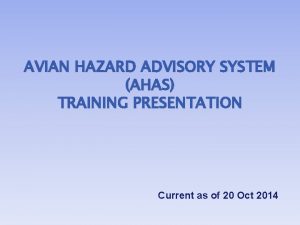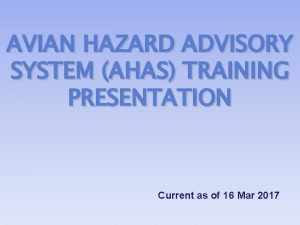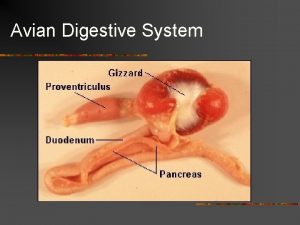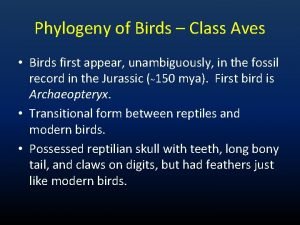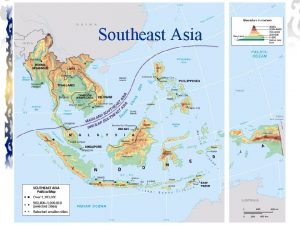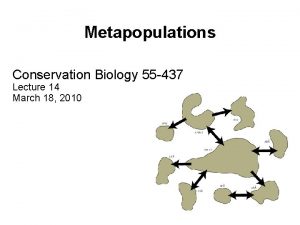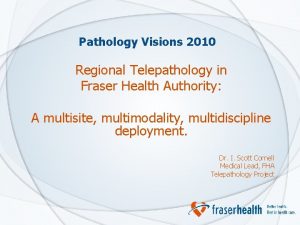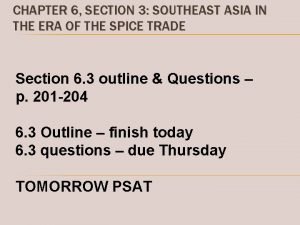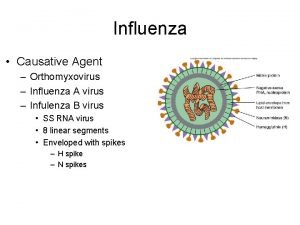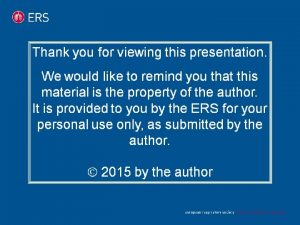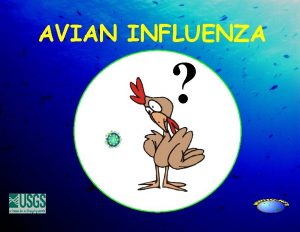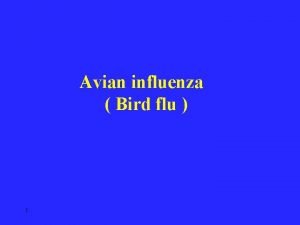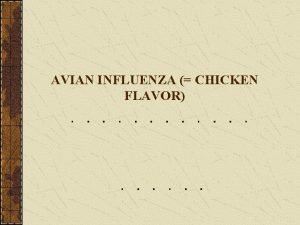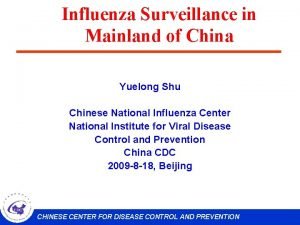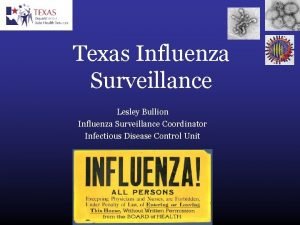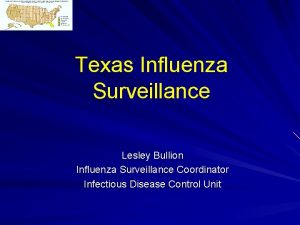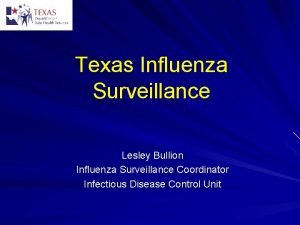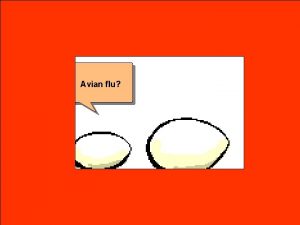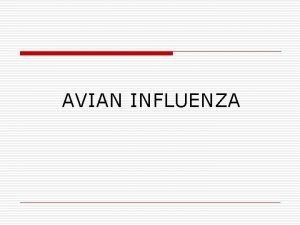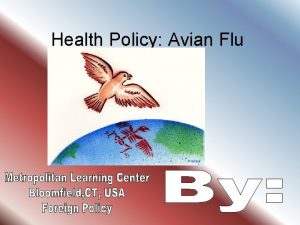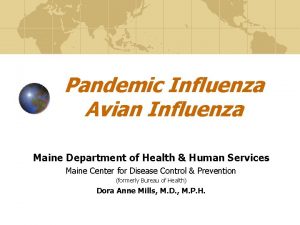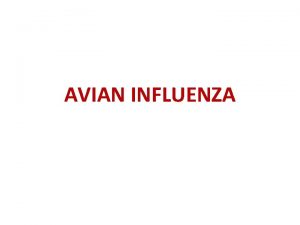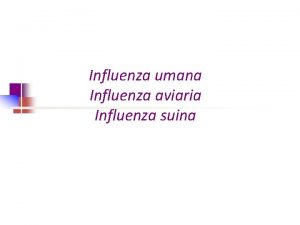Human Avian Influenza Surveillance in mainland of China


















- Slides: 18

Human Avian Influenza Surveillance in mainland of China Yuelong Shu Chinese National Influenza Center National Institute for Viral Disease Control and Prevention China CDC 2009 -8 -19, Beijing CHINESE CENTER FOR DISEASE CONTROL AND PREVENTION

Human Avian Influenza Surveillance in mainland of China l Routine surveillance: Chinese Human Avian Influenza Surveillance System l Pneumonia with unknown cause reporting system l Implementation Plan for National Surveillance on Pneumonia with Unknown Cause (2004) l Implementation Plan for National Surveillance, Diagnosis and Treatment Guidance for Pneumonia with unknown cause (2007) l Emergency Surveillance l After animal or human AI epidemic situations, the corresponding regions should carry out surveillance ILI cases and close contacts. l (Emergency Surveillance Plan for Human Avian Influenza Infection ) CHINESE CENTER FOR DISEASE CONTROL AND PREVENTION

Temporal Distribution of Confirmed HPAI Cases’ Onset Time(N=38) CHINESE CENTER FOR DISEASE CONTROL AND PREVENTION

Geography Distribution Map of HPAI Cases during 2005~ 2009(N=38) urban cases(15) rural cases(23) 确诊H 5 N 1动物疫情(59) 数据来源:卫生部、农业部 China CDC 发现有病死禽地区 (16) CHINESE CENTER FOR DISEASE CONTROL AND PREVENTION 注:不包括 2003年追溯诊断病例

Demographic Characteristics of HPAI Cases (N=38) Male Age Cases Female Percentag e (%) Cases Percentag e (%) Total Cases Percentage (%) 0 -6 0 0. 0 1 2. 6 6 -14 2 5. 3 3 7. 9 5 13. 2 15 -29 9 23. 7 18 47. 4 30 -49 5 13. 2 7 18. 4 12 31. 6 50 -62 2 5. 3 0 0. 0 2 5. 3 合计 18 47. 4 20 52. 6 38 100. 0 Age Male Female Median 24 26. 5 Range (6 -62) (2 -44) CHINESE CENTER FOR DISEASE CONTROL AND PREVENTION

Estimate on incubation Period of HPAI Cases Time interval between Exposure and Onset (day) First Exposure Last Exposure case (%) 16(57) 8 (29) unknown (%) 12(43) 20(71) Median (Range) 7. 5(3 -22) 3. 5(1 -5) Note: 2 military cases were CHINESE CENTER FOR DISEASE CONTROL AND not PREVENTION included

Mortality Rate of HPAI Cases Group Incidence Death Male Female 13 15 8 10 Mortality Rate(%) 62 67 < 15 ≥ 15 5 2 40 23 16 70 Urban Rural Total 11 17 28 9 9 18 82 53 64 Note: 2 military cases were CHINESE CENTER FOR DISEASE CONTROL AND not PREVENTION included

Family Cluster of H 5 N 1 l 1 case was confirmed, the other one died because of severe respiratory disease. 2 cases are of sister-brother relationship. (Hunan) l 2 cases had the same exposure history to sick and dead poultry, onset time have 2 days time-lag. l 2 cases were all confirmed as HPAI cases. They are father-son relationship, and the father developed symptoms while having medical observation as close contact of his son (Jiangsu) l The father took long care of the son in the ward before onset. Therefore, the most possibility for infection is that he directly contacted with the respiratory secretion and intestinal excrement of his son. But the possibility of individual exposure to the same live-poultry markets could not be excluded. CHINESE CENTER FOR DISEASE CONTROL AND PREVENTION

Potential Infection Source of HPAI Cases l 17 cases had direct or indirect contact with sick or dead avian. (For 4 cases, the animal AI outbreaks were confirmed meanwhile) l 9 cases had been to the live-avian market before onset l 1 case’s infection source was unknown l 1 case had taken long care of another confirmed HPAI patient. Therefore, the most possibility for infection is that he directly contacted with the respiratory secretion and intestinal excrement. But the possibility of individual exposure to the same live-poultry markets could not be excluded. CHINESE CENTER FOR DISEASE CONTROL AND PREVENTION

Basic information of 29 Viruses No. 1 2 3 4 5 6 7 8 9 10 11 12 13 14 15 16 17 18 19 20 21 22 23 24 25 26 27 28 29 Strains A/Anhui/1/2005(H 5 N 1) A/Anhui/2/2005(H 5 N 1) A/Guangxi/1/2005(H 5 N 1) A/Jiangxi/1/2005(H 5 N 1) A/Fujian/1/2005(H 5 N 1) A/Sichuan/1/2006(H 5 N 1) A/Sichuan/2/2006(H 5 N 1) A/Hunan/1/2006(H 5 N 1) A/Anhui/1/2006(H 5 N 1) A/Zhejiang/1/2006(H 5 N 1) A/Guangdong/1/2006(H 5 N 1) A/Shanghai/1/2006(H 5 N 1) A/Hubei/1/2006(H 5 N 1) A/Sichuan/3/2006(H 5 N 1) A/Guangdong/2/2006(H 5 N 1) A/Xinjiang/1/2006(H 5 N 1) A/Fujian/1/2007(H 5 N 1) A/Anhui/1/2007(H 5 N 1) A/Jiangsu/2/2007(H 5 N 1) A/Hunan/1/2008(H 5 N 1) A/Guangxi/1/2008(H 5 N 1) A/Guangdong/1/2008(H 5 N 1) A/Beijing/1/2009(H 5 N 1) A/Shandong/1/2009(H 5 N 1) A/Hunan/1/2009(H 5 N 1) A/Guizhou/1/2009(H 5 N 1) A/Xinjiang/1/2009(H 5 N 1) A/Guangxi/1/2009(H 5 N 1) Onset Date 2005 -11 -2 2005 -11 -11 2005 -11 -23 2005 -12 -4 2005 -12 -7 2006 -1 -3 2006 -1 -11 2006 -1 -27 2006 -2 -11 2006 -2 -10 2006 -2 -22 2006 -3 -15 2006 -4 -16 2006 -6 -3 2006 -6 -19 2007 -2 -18 2007 -3 -17 2007 -11 -24 2007 -12 -4 2008 -1 -16 2008 -2 -12 2008 -2 -16 2008 -12 -24 2009 -1 -5 2009 -1 -8 2009 -1 -15 2009 -1 -10 2009 -1 -19 Sampling Date 2005 -11 -8 2005 -11 -17 2005 -11 -29 2005 -12 -10 2005 -12 -12 2006 -1 -11 2006 -1 -17 2006 -2 -4 2006 -2 -19 2006 -2 -21 2006 -3 -4 2006 -3 -21 2006 -4 -13 2006 -4 -24 2006 -6 -11 2006 -7 -2 2007 -2 -25 2007 -3 -23 2007 -12 -1 2007 -12 -5 2008 -1 -24 2008 -2 -19 2008 -2 -23 2009 -1 -5 2009 -1 -17 2009 -1 -16 2009 -1 -22 2009 -1 -21 2009 -1 -24 Sampling Spot Anhui province Guangxi autonomous region Jiangxi province Fujian province Sichuan province Hunan province Anhui province Zhejiang province Guangdong province Shanghai City Hubei Province Sichuan province Guangdong province Xinjiang autonomous region Fujian province Anhui province Jiangsu province Hunan province Guangxi province Guangdong province Beijing City Shandong province Hunan province Guizhou province Xinjiang autonomous region Guangxi autonomous region CHINESE CENTER FOR DISEASE CONTROL AND PREVENTION Survived Yes Yes Yes

Phylogenetic Analysis HA ● Strains of Chinese Human ■ Candidate of Vaccine CHINESE CENTER FOR DISEASE CONTROL AND PREVENTION

Molecular Characterization No. Strains Cleavage Site◇ PB 2 627 AA# NS 1 92 AA△ HA 226 -228 AA☆ LRERRRKRG AAAPPEQ YLTDM QSG 1 A/Anhui/1/2005(H 5 N 1) LRERRRKRG AAAPPEQ YLTDM RSG 2 A/Anhui/2/2005(H 5 N 1) LRERRRKRG AAAPPEQ YLTDM QSG 3 A/Guangxi/1/2005(H 5 N 1) LRERRRKRG AAAPPKQ YLTDM QSG 4 A/Jiangxi/1/2005(H 5 N 1) LRERRRKRG AAAPPKQ YLTDM QSG 5 A/Fujian/1/2005(H 5 N 1) LRERRRKRG AAAPPEQ YLTDM QSG 6 A/Sichuan/1/2006(H 5 N 1) LRERRRKRG AAAPPEQ YLTDM QSG 7 A/Sichuan/2/2006(H 5 N 1) LRERRRKRG AAAPPEQ YLTDM QSG 8 A/Hunan/1/2006(H 5 N 1) LRERRRKRG AAAPPEQ YLTDM QSG 9 A/Anhui/1/2006(H 5 N 1) Note: LRERRRKRG AAAPPEQ YLTDM QSG ◇multiple basic amino 10 A/Zhejiang/1/2006(H 5 N 1) LRERRRKRG AAAPPEQ YLTDM QSG acids characteristic of highly 11 A/Guangdong/1/2006(H 5 N 1) pathogenic avian influenza. LRERRRKRG AAAPPEQ YLTDM QSG 12 A/Shanghai/1/2006(H 5 N 1) #K, associated with LRERRRKRG AAAPPEQ YLTDM QSG 13 A/Hubei/1/2006(H 5 N 1) increased virulence. LRERRRKRG AAAPPEQ YLTDM QSG 14 A/Sichuan/3/2006(H 5 N 1) △E, associated with LRERRRKRG AAAPPKQ YLTDM QSG 15 A/Guangdong/2/2006(H 5 N 1) increased virulence. QGERRRKKRG AAAPPKQ YLTDM QSG 16 A/Xinjiang/1/2006(H 5 N 1) ☆ QSG, preferentially bind LRERRRKRG AAAPPEQ YLTDM QSG A/Fujian/1/2007(H 5 N 1) 17 to α 2, 3 -Neu. Ac. Gal linkages LRERRRKRG AAAPPEQ YLTDM QSG A/Anhui/1/2007(H 5 N 1) of avian cell-surface 18 receptors. LRERRRKRG AAAPPEQ YLTDM QSG 19 A/Jiangsu/1/2007(H 5 N 1) LRERRRKRG AAAPPEQ YLTDM QSG 20 A/Jiangsu/2/2007(H 5 N 1) LRERRRKRG AAAPPEQ YLTDM QSG 21 A/Hunan/1/2008(H 5 N 1) LRERRRKRG AAAPPKQ YLTDM QSG 22 A/Guangxi/1/2008(H 5 N 1) LRERRRKRG AAAPPEQ YLTDM QSG 23 A/Guangdong/1/2008(H 5 N 1) LRERRRKRG AAAPPEQ YLTDM QSG 24 A/Beijing/1/2009(H 5 N 1) LRERRRKRG AAAPPEQ YLTDM QSG 25 A/Shandong/1/2009(H 5 N 1) LRERRRKRG AAAPPEQ YLTDM QSG 26 A/Hunan/1/2009(H 5 N 1) LRERRRKRG AAAPPKQ YLTDM QSG 27 A/Guizhou/1/2009(H 5 N 1) LRERRRKRG AAAPPKQ YLTDM QSG 28 A/Xinjiang/1/2009(H 5 N 1) CHINESE CENTER FOR DISEASE CONTROL AND PREVENTION QRERRRRKRG AAAPPEQ YLTDM QSG 29 A/Guangxi/1/2009(H 5 N 1)

Drug Resistance No. 1 2 3 4 5 6 7 8 9 10 11 12 13 14 15 16 17 18 19 20 21 22 23 24 25 26 27 28 29 Strains A/Anhui/1/2005(H 5 N 1) A/Anhui/2/2005(H 5 N 1) A/Guangxi/1/2005(H 5 N 1) A/Jiangxi/1/2005(H 5 N 1) A/Fujian/1/2005(H 5 N 1) A/Sichuan/1/2006(H 5 N 1) A/Sichuan/2/2006(H 5 N 1) A/Hunan/1/2006(H 5 N 1) A/Anhui/1/2006(H 5 N 1) A/Zhejiang/1/2006(H 5 N 1) A/Guangdong/1/2006(H 5 N 1) A/Shanghai/1/2006(H 5 N 1) A/Hubei/1/2006(H 5 N 1) A/Sichuan/3/2006(H 5 N 1) A/Guangdong/2/2006(H 5 N 1) A/Xinjiang/1/2006(H 5 N 1) A/Anhui/1/2007(H 5 N 1) A/Fujian/1/2007(H 5 N 1) A/Jiangsu/2/2007(H 5 N 1) A/Hunan/1/2008(H 5 N 1) A/Guangxi/1/2008(H 5 N 1) A/Guangdong/1/2008(H 5 N 1) A/Beijing/1/2009(H 5 N 1) A/Shandong/1/2009(H 5 N 1) A/Hunan/1/2009(H 5 N 1) A/Guizhou/1/2009(H 5 N 1) A/Xinjiang/1/2009(H 5 N 1) A/Guangxi/1/2009(H 5 N 1) NA 274 AA# LNAPNYHYEE M 2 25 -42 AA△ PLVVAASIIGILHLILWIL LNAPNYHYEE PLVVAASIIGILHLILWIL LDAPNYHYEE PLVVAASIIGILHLILWIL LNAPNYHYEE PLVVAASIIGILHLILWIL LNAPNYHYEE PLVVAASIIGILHLILWIL LDAPNYHYEE PLVVAANIIGILHLILWIL LDAPNYHYEE PLVVAASIIGILHLILWIL LNAPNYHYEE PLVVAASIIGILHLILWIL LDAPNYHYEE PLVVAASIIGILHLILWIL LNAPNYHYEE PLVVAANIIGILHLILWIL LNAPNYHYEE PLVVAASIIGILHLILWIL Note: #H, predicted to be sensitive to oseltamivir. . △N, mutation in the matrix protein 2, which confers resistance to amantadine. CHINESE CENTER FOR DISEASE CONTROL AND PREVENTION

Characteristics of HPAI Viruses Prevailing in mainland of China 1 2 3 绿色与人一致 红色与禽一致 粉色未知 Gene Position 115 121 137 M 1 NP NS 1 PA PB 2 Distance 1 2 0. 967 3 0. 962 Gene 0. 958 M 1 16 61 283 305 313 357 0. 953 0. 973 0. 981 0. 96 0. 973 0. 964 81 215 227 0. 958 0. 955 0. 966 28 55 57 100 225 268 337 404 409 552 0. 988 0. 984 0. 958 0. 955 0. 969 0. 951 0. 978 0. 967 0. 959 0. 999 44 64 199 271 475 567 588 627 674 702 0. 966 0. 954 0. 997 0. 958 0. 994 0. 977 0. 971 0. 977 0. 969 0. 955 Human 绿色与人一致 红色与禽一致 粉色未知 I Position A A 115 121 137 NP 16 61 283 305 313 357 NS 1 81 215 227 PA PB 2 28 55 57 100 225 268 337 404 409 552 44 64 199 271 475 567 588 627 674 702 D L P K Y K M T R L N Q A C I S S N S S T S A M N I K T R H 1 N 1 1918 V Distance A Human T I 0. 967 0. 962 0. 958 0. 953 0. 973 0. 981 0. 96 0. 973 0. 964 0. 958 0. 955 0. 966 0. 988 0. 984 0. 958 0. 955 0. 969 0. 951 0. 978 0. 967 0. 959 0. 999 0. 966 0. 954 0. 997 0. 958 0. 994 0. 977 0. 971 0. 977 0. 969 0. 955 D I P R Y K I P K L N R A S L A A S S A M S T M N A K A R H 2 N 2 1957 I H 1 N 1 A H 2 N 2 1918 1957 A V I A A A T D L P K Y K D I P R Y K M T R I P K L N Q A C I S S N S L N R A S L A A S S S T S A M N I K T R A M S T M N A K A R D L P K Y K M T R L N Q A C I S S N S S T S A M N I K T R A A D L P K Y K M T R L N Q A C I S S N S S T S A M N I K T R H 3 N 2 1968 I H 3 N 2 A A 1968 I A DA LD PL KPK YY KK M MT R T RL N Q LA NC I QS AS CNS I SS T SS NA M SN I SKT TR S A M N I K T R H 5 N 1 V T T G I L R F Q H 5 N 1 V T Avian T V G I L R F Q T T G I L R F Q deleted I P P deleted E E P D R V S L A A S T A I A T L D A E A K P D R V S L A A S T A M A T L D A E A K Avian V Persistence T T 99. 27% 99. 92% 99. 10% G I 99. 41% 99. 32% L 99. 24% R 99. 07% F 99. 32% Q 99. 32% 99. 74% I 99. 40% P 99. 45% E 99. 73% 99. 27% P 99. 54% 99. 36% D 99. 09% R 99. 91% 99. 27% V 99. 54% S 99. 91% L 99. 11% A 99. 82% A 100. 00% 99. 38% S 99. 91% T 99. 29% 99. 38% 99. 82% A 99. 47% M 99. 38% A T L D A E A K Persistence 99. 27% china_23 99. 92% 99. 10% V T 99. 41% T 99. 32% G 99. 24% I L 99. 07% R 99. 32% F 99. 32% Q deleted 99. 32% L(15) P(8) E 99. 74% 99. 40% P D R 99. 45% V 99. 73% S L 99. 27% A(22) T(1) S(19) A(4) 99. 54% S 99. 36% T 99. 09% 99. 91% A T(7) M(10) I(6) 99. 27% A 99. 54% T L 99. 91% D A(22) T(1) E(18) K(5) 99. 11% A(22) S(1) 99. 82% K 100. 00% 99. 38% 99. 91% 99. 29% 99. 38% 99. 82% 99. 47% 99. 38% CHINESE CENTER FOR DISEASE CONTROL AND PREVENTION china_23 S(19) T(7) V T T G I L R F Q deleted L(15) P(8) E P D R V S L A(22) T(1) A(4) S T A M(10) I(6) A T L D A(22) T(1) E(18) K(5) A(22) S(1) K

Summary l 29 viruses isolated from 37 human cases in mainland China since 2005. l All Viruses contained the motif of multiple basic amino acids at the HA cleavage site characteristic of HPAI. l 29 viruses formed in 3 distinct sublineages, Xinjiang/1/2006 belonged to clade 2. 2; Guangxi/1/2009 belonged to clade 2. 3. 2; the rest belonged to clade 2. 3. 4. l All viruses had H 274 at NA protein, which predicted to be sensitive to oseltamivir; Fujian/1/2007, Beijing/1/2009, Shandong/1/2009 had the S 31 N mutation in M 2, that confers resistance to amantadine, all other viruses have residues indicating sensitivity to amantadine. l Reassortment with prevailing human influenza A virus was not found. CHINESE CENTER FOR DISEASE CONTROL AND PREVENTION

Analysis on Human AI outbreaks in mainland of China l Sporadic HPAI cases would appear continually; l Unknown infection source cases still exist; l Common exposure might caused family cluster; l As new cases increase, the virus could improve its transmissibility among humans by reassortment or adaptive mutation. CHINESE CENTER FOR DISEASE CONTROL AND PREVENTION

Acknowledgements l Chinese Ministry of Health l Chinese Ministry of Science and Technology l WHO l China-US Collaborative Program on Emerging and Reemerging Infectious Disease l Local Centers for disease Control and Prevention CHINESE CENTER FOR DISEASE CONTROL AND PREVENTION

Thank you CHINESE CENTER FOR DISEASE CONTROL AND PREVENTION
 Low pathogenic avian influenza
Low pathogenic avian influenza Avian digestive system
Avian digestive system Avian taxonomy
Avian taxonomy Avian ku ethnicity
Avian ku ethnicity Similar sire similar scion
Similar sire similar scion Avian hazard advisory system
Avian hazard advisory system Bam ahas
Bam ahas Bird digestive system functions
Bird digestive system functions Dispersal definition
Dispersal definition Avian taxonomy
Avian taxonomy Avian phylogeny
Avian phylogeny Mainland of southeast asia
Mainland of southeast asia Metapopulation
Metapopulation Bc health region map
Bc health region map In 1500 mainland southeast asia was a relatively
In 1500 mainland southeast asia was a relatively Piano di divisione delle staffe
Piano di divisione delle staffe Influenza a causative agent
Influenza a causative agent The great influenza rhetorical analysis essay
The great influenza rhetorical analysis essay Influenza
Influenza
